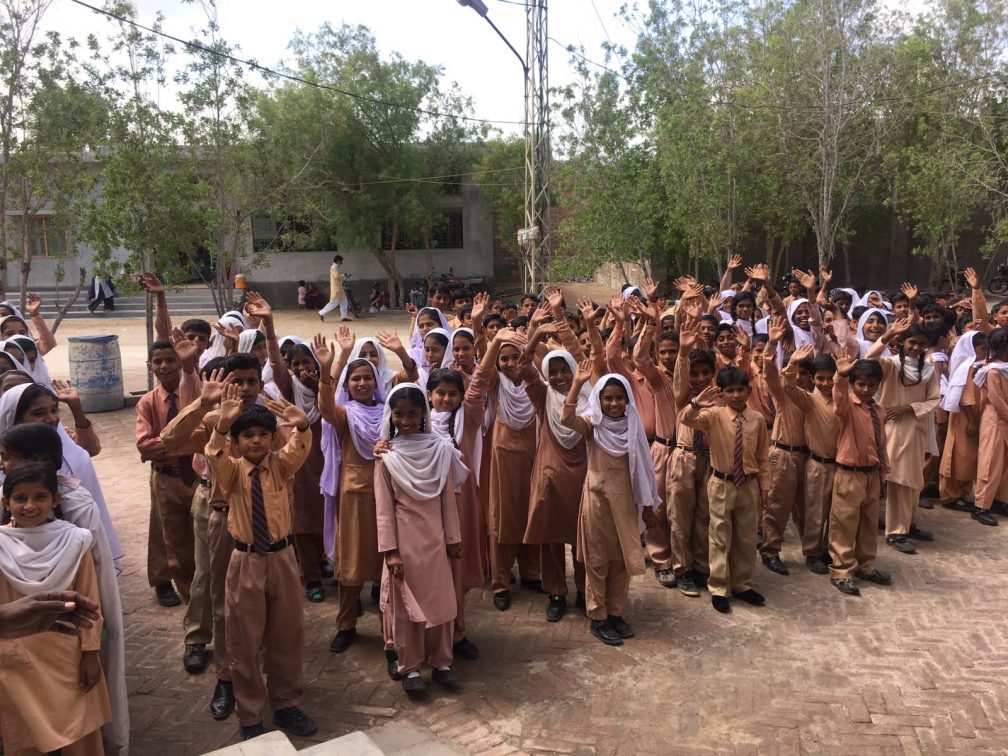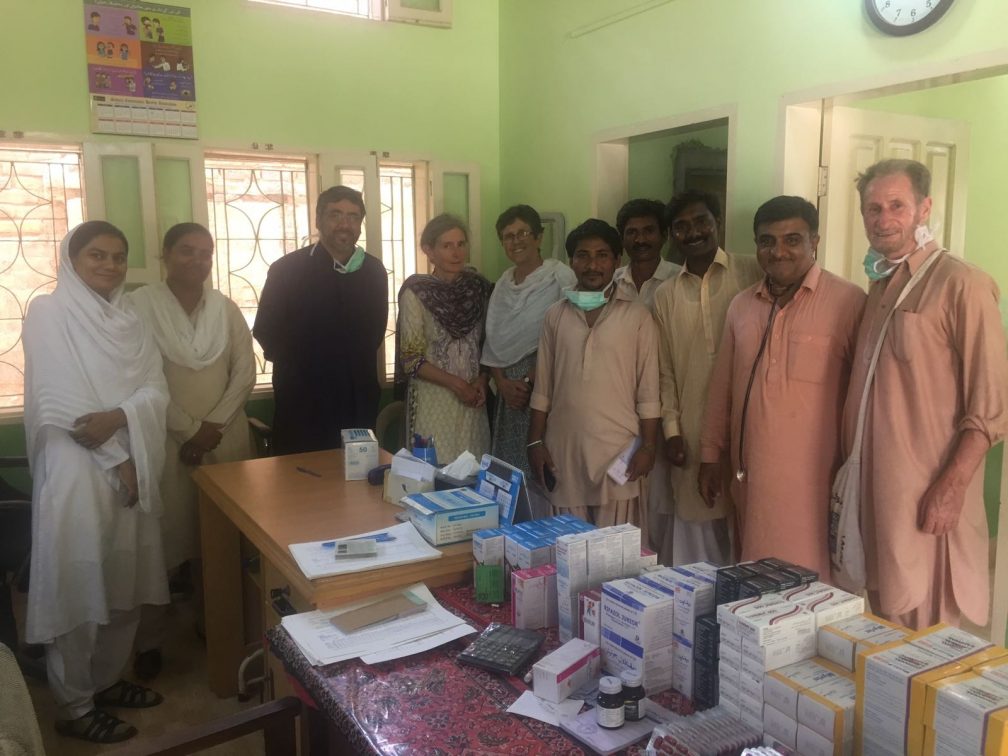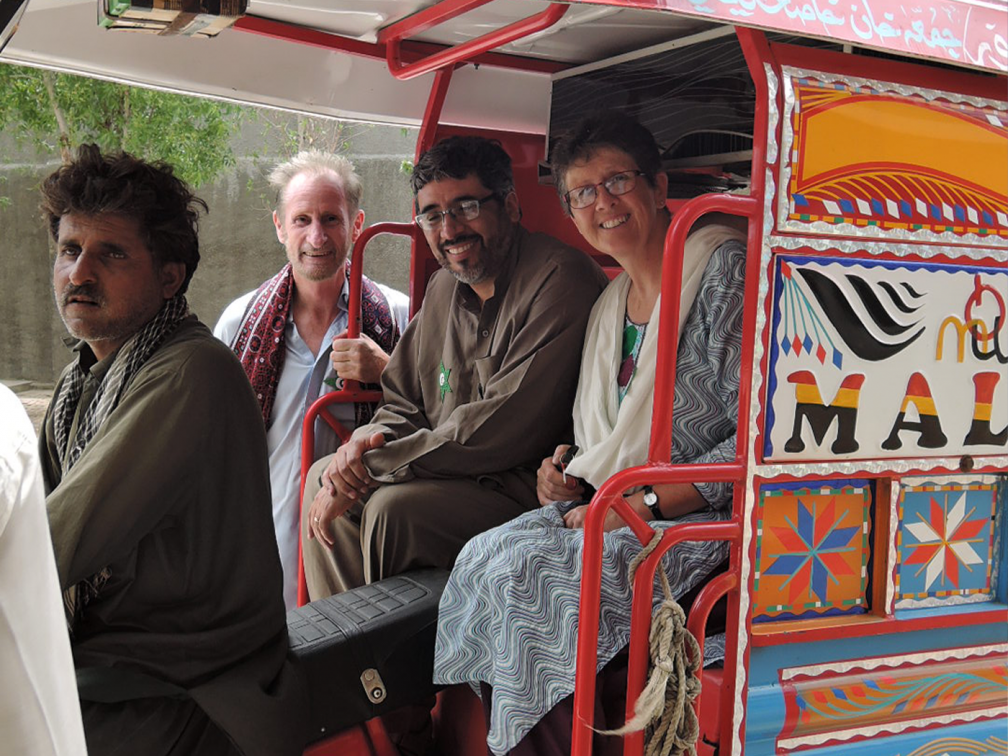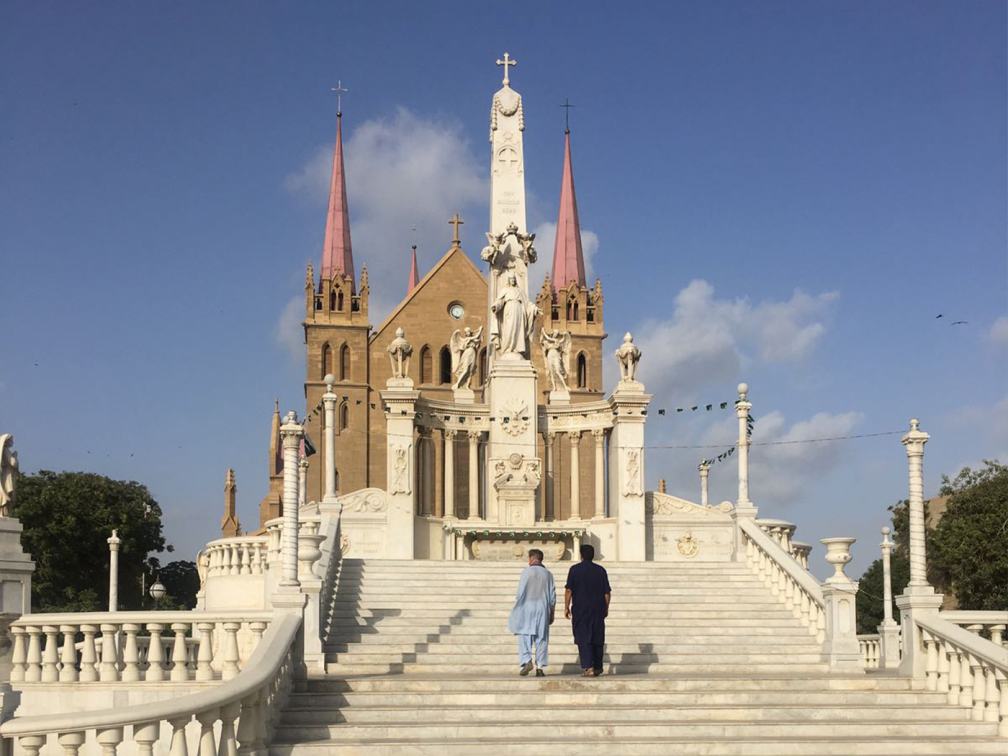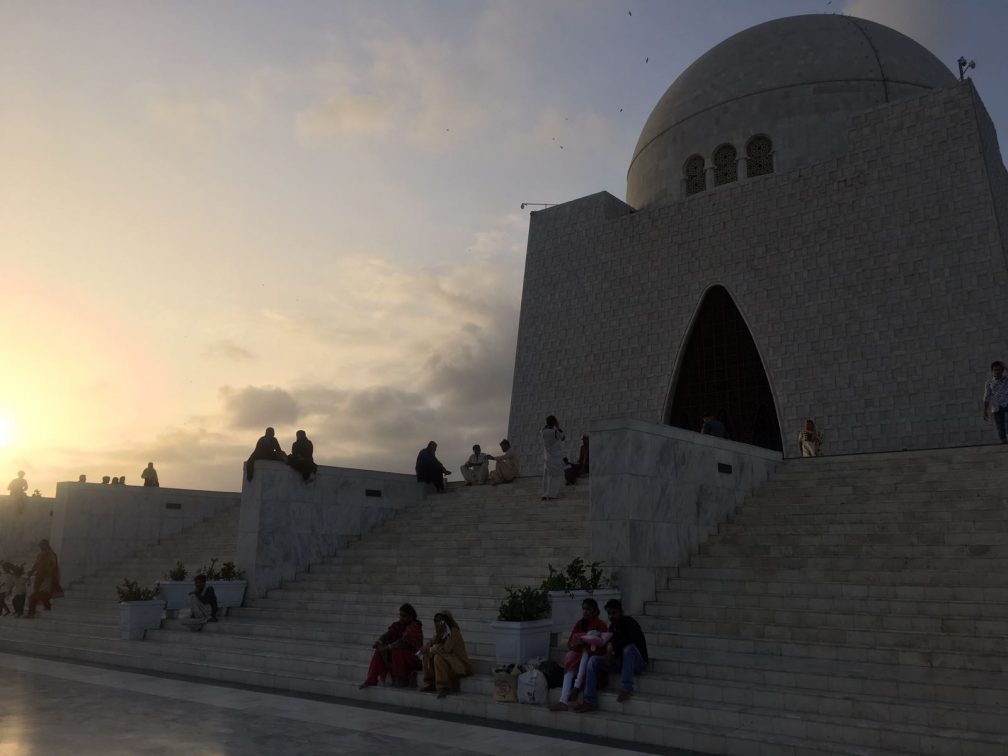Henrietta Cullinan
Our first full day in Pakistan. Finding it hard to be organised with malaria pills, jungle formula, tooth brushing, water bottle, dupatta. I am here in the Badin City, Sindh province Pakistan. We got up in time to see the boys and girls line up in the church compound and sing the national anthem before school. It is a private school that goes all the way up to GCSE level. The boys wear pink- beige shirts and trousers, with a tie-on elastic and the girls wear salwar kamiz in the same colour with loops on the shoulders to hold a white scarf in place.
Then two of us, with the deputy, went to spend a few minutes in each classroom chatting to the students starting with the top class and working downwards to the kindergarten. I felt bad that I was taking up the teachers’ time. It was difficult at first to hear from one or more children, until we came to a geography class, where they discovered asking us questions about England was a good game. What is your national bird? What is your national dress? When did you become independent? I had to sing my national anthem to one class. At breaktime we had hot sweet milky tea with the teachers.
I was lent two salwar kamiz by Columban Fr. Daniel O’Connor and realised this was the only thing to wear. All the clothes I had brought, although modest, are not really suitable, making me stand out just too much. I copied the way the students wore their scarves, which is the opposite way round to hijab wearing girls in London or even Kabul. For prayers and in church you need to put one end of the scarf over your head.
After tea at the school we skipped across the compound to have tea at the TB clinic. We met the doctor and administrator dispensing drugs. All the patients, men on one side and women on the other, were waiting on the verandah. Some women were Parkoli women, with bracelets all the way up their arms. One woman came in to see the doctor and we were allowed to listen to the consultation, wearing face masks. Her husband helped push the bracelets over her elbow so the doctor could take her blood pressure.
On day one there are so many things to trouble us westerners, such as why I should be allowed to listen to her consultation, just because I’m white. Similarly, I was aware of my reaction to the teaching methods in the school – very teacher led. The master told us he taught computer theory and showed me the text book, word, power point etc and my heart sank, which I guess was one of the reactions we talked about in our preparation sessions.
At four, us two women met up with the sisters and the catechist’s wife to go shopping. I was curious to see outside the compound, but I suspected it might not be as simple as wandering along the high street. The sisters were keen not to have us hanging around. I realise that I never see women on the street.
We went to mass at six in the church. Very small children filed in at the front and a catechist played the harmonium. It reminded me of the Ethiopian church in Calais because there were quite a few rituals that you wouldn’t see in England like touching the gospel, touching the icon, touching the incense and the candles. I sat on the mats on the floor. The mass was in Parkari so I kept dozing on the cool matting and with the fan overhead.
After mass we were due to go to the headmaster’s house for supper. We waited on the steps of church as it grew dark and cool, kids coming running up to us, watching the bats and the trees tossing in the wind. The headmaster told us about his life while his little girl curled up on the bed and went to sleep.
Mauricio Silva
‘Praise be to Jesus’ said the old woman as she put both her hands on my head and that of my companions. The friendly and faithful greeting confirmed what I was feeling on this, our fourth day together visiting Pakistan as part of the Columban Invitation to Mission programme. It reminded me of the deepest motivation which moves us to participate in this programme: we cannot but praise God for the generosity and kindness of our host. Despite the many barriers which separate us we are here to testify God’s love for all and particularly for the people of Pakistan.
Today was a day of celebration. In the Eucharist, songs of praise were sung as a group of about 100 people gathered at the church of St. Paul in Badin. Many children and adults were proudly wearing the green colour of the Pakistani flag and a programme involving young people was delivered to mark the occasion of the Pakistani Independence Day.
Over the past days we have been showered with gestures of friendliness and kindness and today, once again, the Catholic community of Badin presented us with traditional scarves and caps, symbols of the Sindhu province. Representing the church in Britain we extended our greetings and promised prayers for Pakistan – church and people. In the evening we celebrated the Eucharist again. This time with a group of Punjabi families (mainly street sweeper families) from a nearby village. Again, smiles and flowers welcomed our presence among them and we enjoyed the living hospitality of a family. Like the elderly lady, we ended the day saying ‘Isou Ne Jei’ – Praise be to Jesus!

Henrietta Cullinan
The four of us spent a full day in Hyderabad, with Columban Fr. Liam O’Callaghan and Danish, a Columban co-worker, visiting two schools and a catechist. Latifabad unit N0.6 was where we spoke to a lawyer working for bonded labourers, followed by a visit to St. John Arif Church, where a Columban sister runs a project for Christian children who need extra support at school. It’s a sort of homework club. The students put on an Independence Day show, our fourth in three days, followed by food. Sitting in the Kali Mori school office, with the first round of tea and biscuits of the day, we heard the headmaster tell us how difficult it was to keep the school going financially. He clicked through the columns of a spreadsheet as he talked, seeing how many months of fees that were owing. The pupils are the children of day labourers who can’t always get work, so the fees don’t come in which means he then can’t pay the teachers. The teachers have to be very dedicated or else they move on and get replaced with teachers of poorer quality.
At the huge girl’s school, St. Mary’s High School, which is where Benazir Bhutto went, we had our second round of cake and drinks. The headmistress told us that a large proportion of the girls are Muslim but she was hoping to offer more bursaries for poor Christian girls. This huge school is a bit like a Catholic public school in the UK. She told us the Muslim parents prefer her school as the students and staff are all honest, no one cheats in exams.
The timetable was on the wall, in a giant wooden frame with the lessons on cards, that looked as if it hadn’t changed for years. Walking through the cool, polished corridors of St. Mary’s High School, seeing the teenage girls studying, destined to be doctors, was quite a different experience from our time in Badin. The students and staff all spoke English and arrived in taxis. It is an elite school. All over the school there were servants to guide, look after the doors and corridors.
Then there were a few steps, but in the unbearable heat, they felt like a hundred steps, into the cathedral precinct next door where we learnt how the traditional water coolers work – the huge stone jars filled with layers of different grades of sand to filter the water and make it safe to drink, or at least safer.
We travelled between places by rickshaw. On the first journey the driver had to stop and remind me to pick up my ‘duppatta’ (scarf) After that I was careful to make sure all the floating parts of my attire were well tucked in, otherwise I could be another Isadora Duncan. Three of us crammed into the shelf-like seat, covered in shiny plastic. I felt as if I was going to slide out. The weight of us western passengers slowed the rickshaw right down as it struggled up the hills but as soon as it picked up speed again, sailing over the flyovers, past a lake, past the giant painted bill boards saying TOLET which looked to me like ‘toilet’ and made me chuckle. Inside, of course, it was a real thrill.
Mauricio Silva
Tomorrow we will leave Pakistan, having spent more than a week here and having visited the cities of Badin, Hyderabad, Mirpur Khas, Karachi and other smaller villages. For our journey back to Karachi the group split in two and Henrietta and Ann went by car with Dan and Danny. Liam and I used public transport. The four-hour journey on the M9 (the ‘super highway’ which connects the cities of Hyderabad and Karachi) encountered countless diversions which are testimony to a more than 15 years delay in its completion due to lack of federal resources. Twice, military personnel got on the bus to check the passengers’ ID – moments in which I tried to become invisible – most likely I did not succeed. Fortunately, the checks were not that rigorous and a photocopy of my passport was enough.
Once in Karachi we were reunited with our female companions at the lovely convent of the Daughters of the Holy Heart of Mary on the grounds of impressive St. Patrick’s Cathedral. Military and civil personnel were preparing for the state funeral of ‘Pakistan’s Mother Teresa’, Sr Ruth Pfau, who spent her life in a successful fight against leprosy. Having in my mind plenty of stories of the struggles faced by the Christian minority in his country, inside the Cathedral I prayed that the recognition gained by this Catholic nun, may be a sign of hope for a better future for our brothers and sisters in Pakistan.
After that, we mounted a couple of colourful rickshaws to make our way to visit the Mazar-e-Quaid, the Jinnah Mausoleum, the resting place of the founder of Pakistan. This magnificent building and the beautiful gardens that surround it, made me feel a sense of peace and tranquility at the end of our journey. We were reminded constantly of the vision and importance of Jinnah for Pakistan. One quote I read in this memorial stuck in my mind: ‘If we want to make this great State of Pakistan happy and prosperous, we should wholly and solely concentrate on the well-being of the people, and especially of the masses and the poor’.

